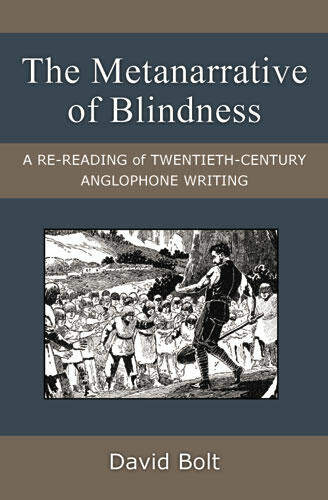The Metanarrative of Blindness
A Re-reading of Twentieth-Century Anglophone Writing
Sheds new light on literary representations of blindness from a disability studies perspective
Description
Although the theme of blindness occurs frequently in literature, literary criticism has rarely engaged the experiential knowledge of people with visual impairments. The Metanarrative of Blindness counters this trend by bringing to readings of twentieth-century works in English a perspective appreciative of impairment and disability. Author David Bolt examines representations of blindness in more than forty literary works, including writing by Kipling, Joyce, Synge, Orwell, H. G. Wells, Susan Sontag, and Stephen King, shedding light on the deficiencies of these representations and sometimes revealing an uncomfortable resonance with the Anglo-American science of eugenics.
What connects these seemingly disparate works is what Bolt calls “the metanarrative of blindness,” a narrative steeped in mythology and with deep roots in Western culture. Bolt examines literary representations of blindness using the analytical tools of disability studies in both the humanities and social sciences. His readings are also broadly appreciative of personal, social, and cultural aspects of disability, with the aim of bringing literary scholars to the growing discipline of disability studies, and vice versa. This interdisciplinary monograph is relevant to people working in literary studies, disability studies, psychology, sociology, applied linguistics, life writing, and cultural studies, as well as those with a general interest in education and representations of blindness.
David Bolt is Associate Professor in Education Studies at Liverpool Hope University and the founding editor of the Journal of Literary & Cultural Disability Studies.
Reviews
“The scope of The Metanarrative of Blindness is comprehensive and its findings convincing. The prose is eloquent and frequently witty, which will make the book accessible to disability studies scholars as well as to scholars in other fields of literary studies . . . a valuable study that advances the field and will inspire future scholarship.”
—Georgina Kleege, University of California, Berkeley
By calling attention to the metanarrative of blindness and its implications, Bolt has produced a worthwhile and fascinating study.
- Christopher Krentz
--Christopher Krentz, ALH Online Review
"This is a fascinating and readable exploration of how a range of fictional and autobiographical texts represent ‘blindness’ and ‘the blind’. Its originality lies not so much in David’s discussions of the texts themselves, but more in his argument that fictional representations of blindness have created a set of myths and stereotypes of blindness which dictate how society treats the blind."
- Hannah Thompson
--Hannah Thompson, Blind Spot
"A lucid, wide-ranging, and provocative text, it offers a careful critique of the cultural narratives surrounding—and constructing—visual impairment in the twentieth century...The Metanarrative of Blindness is a valuable text for scholars across literary and cultural (disability) studies."
- Hannah Tweed
--Hannah Tweed, H-Disability
"In his fascinating book through the brilliant examination of English and American literary texts D. Bolt endeavors to dismantle these concepts [of ocularcentrism and ableism] and to deconstruct some stereotypes which are so widespread in our ophtalmocentric world."
- Nosenko-Stein Elena
--Elena Nosenko-Stein, Novoe literaturnoe obozrenie (New Literary Review)
"The Metanarrative of Blindness is an immensely valuable contribution to the field. It is already becoming a foundational text for students and scholars working on societal, cultural, and literary depictions of disability in general and blindness in particular and it undoubtedly has the potential to inspire a new wave of scholarship in this area."
- Hannah Thompson
--Journal of Literary & Cultural Disability Studies
"Part of an increasingly dynamic body of work on literary and cultural disability studies, The Metanarrative of Blindness offers a provocative critical alternative to criticism of these contemporary texts."
- Modern Literature
--Modern Literature
"This brilliant examination of literary texts succeeds in dismantling long-lived concepts and deconstructing some stereotypes which are so widespread in our ophthalmocentric world."
- Elena Katz/Elena Nosenko-Stein
--Disability & Society

